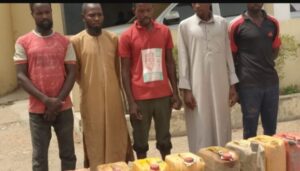Despite ongoing efforts by governments at all levels to contain the menace of cultism and the proliferating non-state armed groups, the scourge of cultism and militancy will continue to fester in Nigeria as the deeply troubled country approaches another election cycle in 2023.
Since the inception of the persisting civil rule (not yet democracy) in 1999, the quest for political power across the major parties has been generally nasty. Neither President Muhammadu Buhari’s All Progressives Congress (APC) that rose to power on the crest of ‘’Change’’ in 2015 nor the Peoples Democratic Party (PDP) that dominated the affairs of the country till that year, has any form of internal democracy.
This worrisome deficit of democracy in the parties can boldly help to explain why both the Executive and the Legislative arms of government are unable to offer the political sovereigns what they don’t have. Disputes after elections in the country have the same telltale signature of what happens after party congresses, conventions, and primaries for the recruitment of electoral candidates. That again, is why power seekers and their sponsoring godfathers generously patronise violence entrepreneurs all over the country. Politicians have been stealthily exploiting Boko Haram, bandits, herders, cultists, and all manners of militia groups to their advantage.
In the Niger Delta area, the country’s main oil and gas region, studies have already shown that cultism and militancy will continue to fester so long the current form of cracydemo or demonstration of craze as the legendary Fela Anikulapo-Kuti will have it, persists in the country. A local researcher says cultism in the oil region is “like a vine that is growing: it will never stop.”
Stakeholder Democracy Network (SDN) says, personal links to local cult groups are also a political asset to some political elite and power seeker. SDN is however working with communities and engaging with governments, companies and other stakeholders to ensure the promotion and protection of human rights, including the right to a healthy environment in the Niger Delta.
Across the region, secret societies such as the Supreme Vikings Confraternity, Neo Black Movement of Africa, and the Icelanders, among others, are linked to powerful politicians, ex-militants, and criminal gangs.
According to SDN, belonging to a cult or confraternity is often a prerequisite for obtaining a government appointment or ascending the political ladder.
Aspiring politicians “must tick the box”, the local researcher who did not want his name in print says.
As previous elections in the Niger Delta have demonstrated, politicians have long relied on ex-militants and other armed youth to act as violence entrepreneurs (thugs) to secure election outcomes.
“Politicians need groups of criminals and assassins around them to provide intelligence and do their dirty work”, says SDN’s political researcher. Having played this role for others, ex-militants are well positioned to flex such grassroots political muscle on their own behalf.
‘’The established political class and traditional leaders in the Niger Delta are seen by the public as divisive figureswho are, self-serving, compromised by the region’s oil politics, detached from the lived realities of constituents, and declining in popular legitimacy.
‘’Political appointments offer ex-militants an opportunity to reinvent themselves as legitimate leaders and decision-makers, who are champions of hometown interests, and thus enjoy a genuine level of localised constituent support.
‘’For an incumbent politician, low-level political appointments are an easy way to reward loyalty, buy-off a dissenter or potential rival to their agenda, and build constituent support for a second tenure.
‘’Common appointments such as special assistants, local council chairmen and councilors, or members of ad-hoc security task forces havefew responsibilities, so are attractive to appointees who can continue with other occupations alongside the role’’, says SDN..
The first civilian Governor of Bayelsa state, DiepreyeAlamieyeseigha (May 1999 – December 2005), is regarded as a pioneer of this approach. According to SDN, ‘’Alamieyeseighainstituted a patronage system that has been followed by his successors in Bayelsaand beyond, resulting in thousands of political appointees to date.
‘’This type of political opportunity is within the gift of the benefactor, meaning the position can be easily revoked or investigated, ensnaring the appointee in the governor’s agenda and political machinery.’’
As one ex-militant leader explains: “if you are given an appointment under a political party, then you are a politician.” In this capacity, they play a supporting role to their political godfathers, whose demands for loyalty constrain ex-militants’ day-to-day decisions and long-term career potential.
Often self-interested and neglectful, these political sponsors frequently fail to deliver promised patronage to ex-militants’ communities. This increases ex-militants’ incentives to short-circuit the political order by running for office themselves.
Marshaling money, muscle, and relationships
‘’Ex-militants make formidable political candidates because they already possess the tools to mount a successful election campaign: financial wherewithal, grassroots networks,mobilisation capacity, and the means to intimidate opponents, election officials, and even voters themselves.
‘’A political career does not necessarily preclude an ex-militant leader from maintaining these financial and operational interests; it can even be an opportunity to use these assets to increase power and resources.
‘’The Presidential Amnesty Programme (PAP) has also served as a financial stepping stone for ex-militants seeking to transition into government. In the first phase of the programme, the region’s top militant leaders were put in charge of distributing stipends to their followers.
‘’Several leaders also received lucrative pipeline surveillance and other government contracts. The second and third phases of the amnesty bolstered these leaders’ financial position and political relevance, functioning as a form of patronage to ‘clientelise’ local youth, some of whom had not necessarily been active as militants’’, SDN said.
In the words of one first phase PAP leader: “Third phase amnesty is a business amnesty, because most are still our boys.” The second and third phase ex-militants are now returning from overseas scholarships and vocational training opportunities, which bought loyalty that can be converted into support during campaigns and elections.
SDN says successful ex-militant leaders like Tompolo and Pastor Reuben also operate visible and well-funded philanthropic foundations that distribute basic resources such as rice, potable water and cash to communities in their political orbit.
These foundations have increasingly provided basic services, such as education and healthcare, where the government has not. This increases the influence of ex-militant leaders beyond direct dependents. However, it ties their legitimacy to their ability to generate material benefits for their constituents, which is a precarious position to be in without direct access to state resources.
Motivations to move into formal politics
Several factors drive ex-militants’ involvement in mainstream politics. First, political power opens up new opportunities for them to accrue power and wealth, especially in relation to the oil and gas industry, which are otherwise controlled by the political elite.
According to ex-militants’ leader:“It’s only politics that can put people into positions, not any other thing. Forget about the oil companies, it is politicians that control them…it is only those who can influence oil companies to give you a job, so we have to move with politicians to get things from companies. I go direct to get what I want, that is how we play.”
Ex-militants often claim they want to bring tangible benefits – jobs, contracts, training opportunities, and other forms of patronage – to their local communities, which echoes the rallying cry from their militant past.
While there are many factors that mean this may not happen in practice, it provides a powerful campaign narrative at the grassroots level.
With their comparatively strong grassroots connections, ex-militants believe they can curtail security challenges and deliver on the development needs of the people more effectively thanincumbent politicians.
One ex-militant leader explains: “Incumbent politicians are not doing it, and we don’t have the right people there to do that. Many of those that got into office [their aim] is to fight for themselves, how they can enrich themselves, that is the business of these days…If I am [elected] today, I will use initiative. I have ideas what I will do to generate funds that most of those people sitting in that seat do not know.”
In becoming a politician, some ex-militants hope to capitalise on their capacity as violence entrepreneurs, by organising political violence on their own behalf, rather than as a thug-for-hire for another politician.
A global rights group, Human Rights Watch observed that much of the compensation that politicians promised to the groups they helped finance and arm during the 2003 elections never materialised, whether in the form of cash or government jobs.
This has become common in subsequent election cycles in the Niger Delta. Rather than continue risking betrayal, ex-militants may use their capacity to back their own trusted candidate, or even run themselves.
Ex-militants are however, mindful that the PAP will not last indefinitely and that their window to pursue a more lucrative and less risky career is closing. PAP has been running for over one decade, far beyond the planned end date.
There is constant speculation surrounding its existence, and it will continue to be used as a bargaining tool with the region during elections so long as no exit strategy is defined. Without political independence, ex-militants are forced to remain ‘loyal’ to theChairman of PAP, even if in disagreement with them and/or the Federal Government.
Since the 2009 start of the Niger Delta amnesty programme, dozens of self-described former agitators (ex-militants) have migrated out of the creeks and into politics. Initially, many acted as political thugs, or ‘godfathers’, to help mainstream politicians win elections, in exchange for payoffs, privileges, and the protection of their activities.
Increasingly, though, ex-militants are entering mainstream political positions, obtaining government appointments, and winning local government, federal, and state legislative elections.
The role and performance of these actors will continue to evolve up to, and beyond, the 2023 elections. While this does not represent a positive trend for democracy, early indications tend to suggest that it poses no more of a threat to democracy and governance than the continued dominance of the region’s violence-sponsoring political class.
Key messages according to SDN
- PAP helped bring ex-militants into the mainstream; position themselves as legitimate candidates for political positions; and provide resources to build their support base.
- As senior ex-militants have migrated into political positions, it has becomeeasier for politicians to mobilise ex-militant groups to protect and enforcetheir mandates.
- Although most ex-militants are dependent on appointments granted by the existing political class, they are increasingly running for office themselves to reduce dependence and consolidate power.
- The effect of ex-militants migrating into politics, who are easily able to deploy force and violence to subvert the democratic process, may not pose any greater threat to the region than the already violent and heavily patronage-based political system.
- Initial indications suggest that the perception in communities may be that ex-militants are more capable and willing to provide security and development, as there are stronger ties between militant leaders and their constituents.







